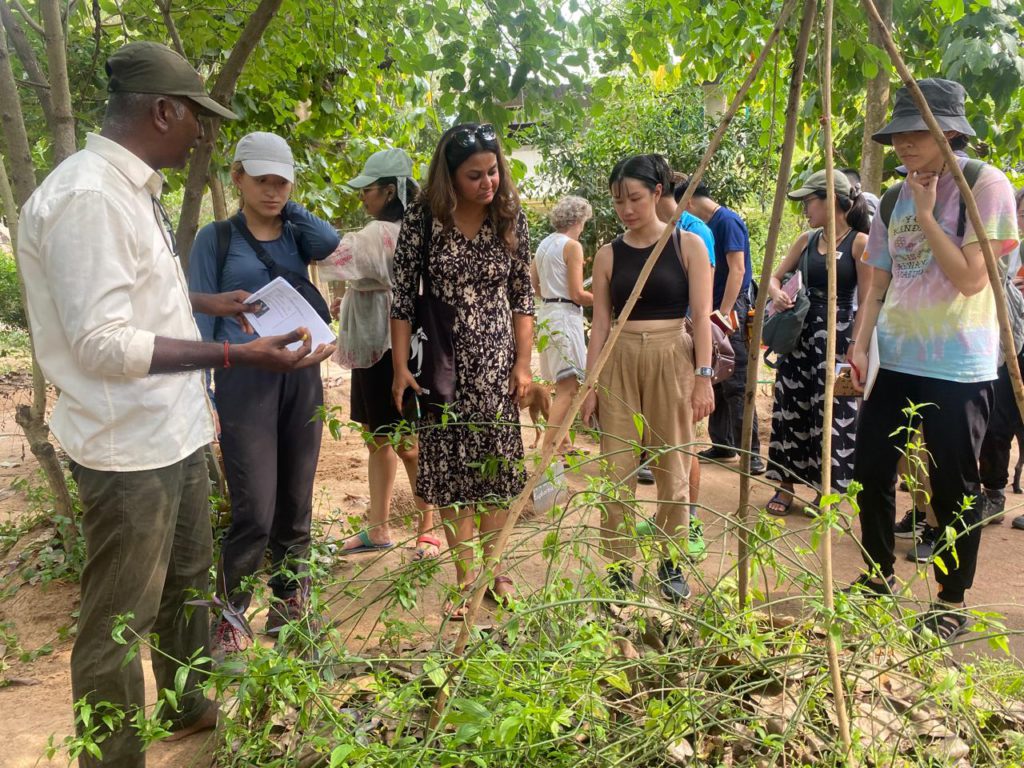A Story of Healing and Discovery
As a child, Sivaraj struggled with asthma. His parents took him to numerous hospitals, hoping to find a cure for his persistent wheezing, but nothing seemed to help. Desperate, they turned to their village in search of traditional remedies and alternative medicine. It was then that some villagers told them of herbs growing in a nearby forest—plants they had used for generations as medicine. The family gathered the herb, crushed it, and fed it to Sivaraj. To their amazement, after just three days of taking the remedy, his wheezing subsided.
Years later, this formative experience with herbal medicine inspired Sivaraj to establish the Martuvam Healing Forest with the objective of spreading to the larger community the knowledge and experience of medicinal herbs that he had gathered over time.
Martuvam Healing Forest currently features a lush garden and forest, a space for students and those looking to volunteer in Auroville, a community kitchen, and a developing healing center. It offers a quintessential Auroville experience, blending community living, sustainability, and mindful engagement with nature. Martuvam also offers hands-on workshops that acquaint participants with numerous medicinal plants and herbs, sharing vital knowledge about their benefits and the various ways to consume them. These workshops are complemented by thoughtfully prepared educational and training materials that are designed to provide a holistic and well-rounded learning experience in herbal medicine. The ethos of Martuvam embraces healing through nutrition and conscious living, encouraging people to make lifestyle choices that are in tune with nature and promote holistic well-being.
A Walk in the Healing Garden
As we stepped into the thriving garden of Martuvam, a welcoming sense of tranquility appeared to seep into us. The vibrant greenery, teeming with the sounds of chirping birds, and coupled with beautifully painted stone slabs bearing plant names and their medicinal uses, began to inform a renewed perception of nature within us. Plants and shrubs that we tended to overlook, and paid little attention to otherwise, suddenly seemed immensely valuable and full of potential.
We made our way to a small community kitchen at the center of the garden, where our host, Sivaraj, and Sylve, a French Aurovilian and long-term volunteer at Martuvam, awaited us with warm smiles. While we sat talking to Sivaraj, we were offered a warm cup of hibiscus tea that was wonderfully soothing. As Sivaraj shared with us the story of Martuvam—which he founded in 2002 on a barren piece of land—our surprise grew upon knowing that the garden and the mini-forest we were seeing around us had been created from such humble beginnings. Through unwavering resilience, dedication, and a deep-rooted belief in the healing power of nature, Sivaraj and his team have transformed the land into a flourishing sanctuary of medicinal plants. They had tended to the barren land, and now, in return, the land is nurturing them.
As Sivaraj guided us through the garden, he introduced us to a variety of plants, such as Jatropha Gossypiifolia—locally known as Kattamanakku—a plant known for treating skin-related issues. Sivaraj also pointed out several other plants that were particularly useful in managing health conditions, such as herbs known to help regulate insulin levels for people with diabetes. He showed us plants that were considered beneficial for eyesight, which could be consumed by mixing with other greens and preparing as a chutney. By simply incorporating abundantly present, locally-grown herbs, into diets, it is possible for people to experience desirable changes in their overall health. He said that while these healing plants grow abundantly around us, many remain unaware of their benefits and uses, and spoke passionately about wanting to resolve this irony through Martuvam.
During our visit, Sylve also showed us the handbook and workbook on medicinal herbs that she had been developing for learners visiting Martuvam. Each page featured information about various herbs— illustrative pictures, and practical notes on their medicinal uses, and their names in multiple languages including Tamil—making the content accessible and enriching for learners of all backgrounds.
More than a Garden
As our visit drew to a close, we realized that Martuvam Healing Forest was more than just a garden. It was a living repository of traditional knowledge—a place where medicinal herbs were cultivated, natural remedies were offered, and the community was educated about the rich healing potential of local plants.
In a world leaning ever more on modern medicine, Martuvam Healing Forest stands as a powerful reminder of the healing wisdom rooted in the natural world around us.

Book a visit or participate in one of Martuvam’s hands-on workshops through Auroville Green Practices. Whether you’re a curious learner or an active practitioner, Martuvam Healing Forest offers a serene and grounded space for reconnecting with the healing rhythms of nature.


